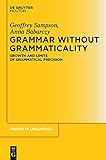Grammar without grammaticality : growth and limits of grammatical precision / Geoffrey Sampson, Anna Babarczy.
Material type: TextSeries: Trends in linguisticsStudies and monographs ; 254.Publisher: Berlin ; Boston : De Gruyter Mouton, [2014]Copyright date: 2014Description: 1 online resource (359 pages) : illustrationsContent type: text Media type: computer Carrier type: online resourceISBN: 9783110290011Subject(s): Grammaticality (Linguistics) | Grammar, Comparative and generalGenre/Form: Electronic books.Additional physical formats: Print version:: Grammar without grammaticality : growth and limits of grammatical precision.DDC classification: 415 LOC classification: P299.G7 | S26 2014Online resources: Click to View Summary: Grammar is said to be about defining all and only the 'good' sentences of a language, implying that there are other, 'bad' sentences - but it is hard to pin those down. A century ago, grammarians did not think that way, and they were right: linguists can and should dispense with 'starred sentences'. Corpus data support a different model: individuals develop positive grammatical habits of growing refinement, but nothing is ever ruled out. The contrasting models entail contrasting pictures of human nature; our final chapter shows that grammatical theory is not value-neutral but has an ethical dimension.
TextSeries: Trends in linguisticsStudies and monographs ; 254.Publisher: Berlin ; Boston : De Gruyter Mouton, [2014]Copyright date: 2014Description: 1 online resource (359 pages) : illustrationsContent type: text Media type: computer Carrier type: online resourceISBN: 9783110290011Subject(s): Grammaticality (Linguistics) | Grammar, Comparative and generalGenre/Form: Electronic books.Additional physical formats: Print version:: Grammar without grammaticality : growth and limits of grammatical precision.DDC classification: 415 LOC classification: P299.G7 | S26 2014Online resources: Click to View Summary: Grammar is said to be about defining all and only the 'good' sentences of a language, implying that there are other, 'bad' sentences - but it is hard to pin those down. A century ago, grammarians did not think that way, and they were right: linguists can and should dispense with 'starred sentences'. Corpus data support a different model: individuals develop positive grammatical habits of growing refinement, but nothing is ever ruled out. The contrasting models entail contrasting pictures of human nature; our final chapter shows that grammatical theory is not value-neutral but has an ethical dimension.
Includes bibliographical references and index.
Grammar is said to be about defining all and only the 'good' sentences of a language, implying that there are other, 'bad' sentences - but it is hard to pin those down. A century ago, grammarians did not think that way, and they were right: linguists can and should dispense with 'starred sentences'. Corpus data support a different model: individuals develop positive grammatical habits of growing refinement, but nothing is ever ruled out. The contrasting models entail contrasting pictures of human nature; our final chapter shows that grammatical theory is not value-neutral but has an ethical dimension.
Description based on print version record.
Electronic reproduction. Ann Arbor, MI : ProQuest, 2016. Available via World Wide Web. Access may be limited to ProQuest affiliated libraries.


There are no comments on this title.